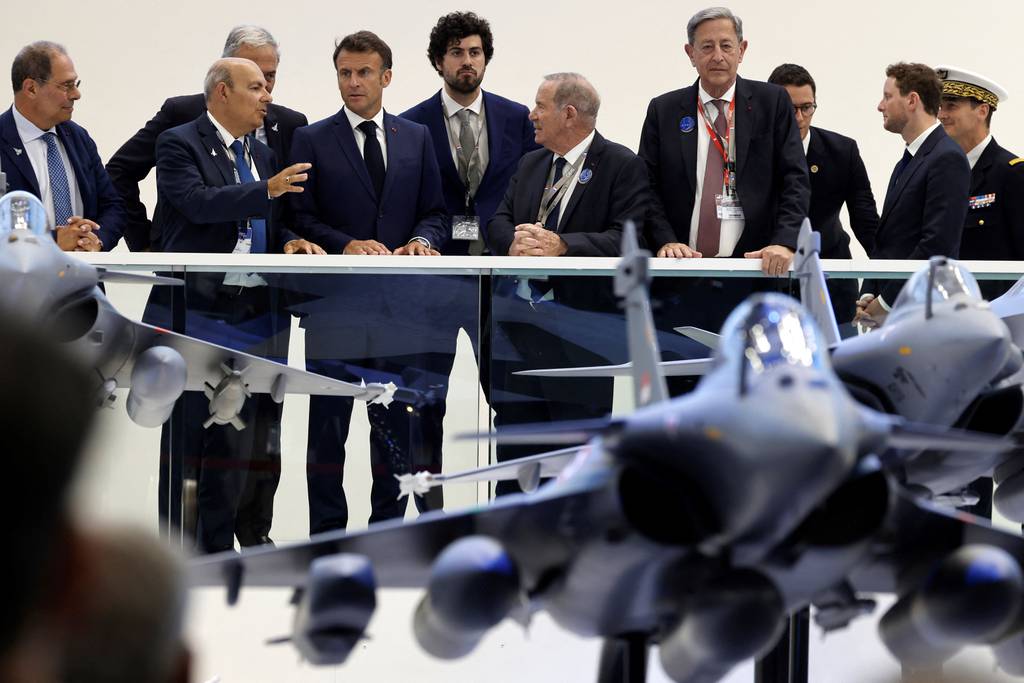
PARIS — Dassault Aviation said the production ramp-up of its Rafale fighter jet continues to be impacted by supply chain disruptions in the aerospace industry.
Lifting the Rafale production pace to three a month at the final assembly plant in Mérignac in southwest France “is more difficult right now,” and reaching that rate is more a question of next year than this year, CEO Éric Trappier said at a press conference Tuesday night in Saint-Cloud outside Paris.
Aircraft makers have been struggling with supply chain issues since the end of the Covid-19 pandemic, with Airbus last month cutting its delivery estimates for commercial aircraft in 2024 on a shortage of supplies including structural parts and engines. Dassault Aviation, which also makes the Falcon series of business jets, last year delivered 13 Rafale fighters, two fewer than planned.
“We’re doing everything we can to deliver to our customers on time, but it’s difficult and it’s going to stay that way,” Trappier said. “It’s not just a Dassault issue, if you’ve seen the Airbus announcements and the difficulties of the aeronautical supply chain in all areas.”
The CEO said the company has not caught up the “small delay” in Rafale deliveries last year, but “we haven’t fallen that far behind.” He said the company’s 2024 delivery target requires a production pace of around two jets a month.
Must Read: Dassault CEO Trappier hints at ‘Plan B’ for troubled FCAS warplane
Dassault Aviation delivered six Rafale jets to the French Air Force in the first half of 2024, and repeated its target to deliver 20 of the fighters this year. The company had orders for 223 Rafales in its books at the end of June, including 159 new jets for export clients, an increase of 12 aircraft from end-December after an order from Indonesia.
“We have signed contracts for the Rafale, so we have to deliver on time,” Trappier said. “For the moment, that’s what we’re doing. That said, I’m relatively optimistic that we’ll manage to deliver the Rafales in our order book. I’m even ready to take on new orders, so that should reassure you.”
The company has been able to exceed a rate required for three jets per month at its structural parts plant in Seclin, “it’s harder in final assembly,” according to Trappier. The CEO said final assembly is like putting together a Lego kit, with one missing part meaning “you can’t get it right.”
“Our upstream primary parts factories, subcontractors and assembly plants are ramping up to deliver Rafales in line with our contracts, and we still have some capacity to take on new contracts,” Trappier said. “For the time being, it’s final assembly that’s the most difficult.”
The main difficulties are in structural parts as well as a “whole host of supplies and small equipment items,” and Dassault Aviation is providing support to its small and medium-sized subcontractors and suppliers, including by providing staffing and financing, and discussing price increases. The aid doesn’t prevent delays, and the main problem at the moment is delivering aircraft, according to the executive.
Dassault Aviation is in talks with a number of countries for Rafale exports, and is working with French armaments agency DGA for a first contract to develop the Rafale F5 standard, which will team up with a combat drone.
The company is overseeing studies for the fighter component of the Future Combat Air System, and German, Spanish and French teams working together in Saint-Cloud have completed wind-tunnel studies to determine the shape of the future jet at the center of the system. The companies involved now have to agree on dividing the work on the next phase, building a demonstrator aircraft.
Work on the FCAS demonstrator is scheduled to start in 2026, though Trappier said that’s “a theoretical timetable,” as the Germany Bundestag will have to authorize the budget, and France will need a functioning government in place to implement that country’s military programming law.
While Dassault Aviation is getting ready for the FCAS demonstrator phase, the CEO said “we’re far” from having a program. The French aircraft maker is also starting its work on the future Rafale F5 standard, with a proposal for a combat drone that can team with the jet “a little after 2030,” and which is separate from FCAS.
“We have a number of subjects running in parallel, and we’ll see what the states decide,” Trappier said. “We’re pushing ahead with our projects and doing the work for which we’ve signed contracts. After that, there are other contracts to sign tomorrow, so there will be further discussions and negotiations. We’ll see how everything develops.”
Author: Rudy Ruitenberg
Source: DefenseNews



